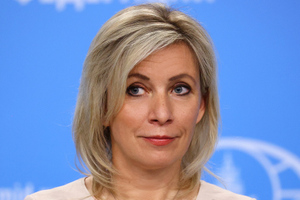FT analysts revealed what China's interest in the peace plan for Ukraine China

 PIONEER MEIZHENG BIO-TECH (5 in1) JC0586 - Antibiotic tests 5 in 1 / Rapid tests for determining the residual amount of β-lactams, tetracyclines and cephalexin in milk, whey
PIONEER MEIZHENG BIO-TECH (5 in1) JC0586 - Antibiotic tests 5 in 1 / Rapid tests for determining the residual amount of β-lactams, tetracyclines and cephalexin in milk, whey Express tests for determining the residual amount of β-lactams, tetracyclines, chloramphenicol, streptomycins in milk, whey
Express tests for determining the residual amount of β-lactams, tetracyclines, chloramphenicol, streptomycins in milk, whey
China's peace initiative to resolve the conflict in Ukraine is linked to Beijing's desire to revive foreign investment and trade, as well as maintain access to European technology, Financial Times (FT) analysts believe.
The authors of the article note that Washington continues to impose new sanctions against Beijing , and the possible “defeat” of Moscow in the conflict in Ukraine is unprofitable for China, since Russia is a “useful partner for China in countering US hegemony.” "The peace plan <...> is the most ambitious gambit in Beijing's difficult balancing process," the article says.
FT experts pointed out that at present, the Chinese economy has not yet recovered from the restrictions due to covid-19 and is in dire need of Western investment and technology. “The war in Ukraine played a decisive role in the deterioration of China's relations with Europe. This was the main reason why China took a defensive stance. Now they want something to oppose it,” said Li Mingjiang, a professor at Nanyang Technological University in Singapore.
AFP learned that China did not discuss the draft peace agreement with Kiev Politics
The Financial Times recalls that US-China relations are at their lowest level "in decades", especially after Washington shot down several balloons in the skies over the United States this month . Therefore, according to FT experts, Beijing has focused its efforts on improving relations with the European Union.
“China’s relations with Europe are not going as well as we would like, but not as dire as many Western commentators suggest,” said Ryan Huss, China expert at the Brookings Institution think tank.
Beijing's peace initiative could help restore relations with Europe, as well as help Russia "find a way out of the conflict," writes the FT. "They [China] want better relations with Europe, but they also don't want this war to go in the direction of Russia's total defeat," said Yun Song, a China expert at the Stimson think tank in Washington.
Read PIONERPRODUKT .by In the UAE, the rules of inheritance have changed. What does this mean for residents What will happen to the Russian economy in the next 10 years: two main scenarios Where they are now looking for oilExxonMobil, BP and Shell How Russians Can Get Legal Aid in the EU Under SanctionsNYT reported on China's attempts to distance itself from Moscow Politics
After the start of the special operation, China did not impose sanctions against Russia and condemned similar steps by other countries. Chinese President Xi Jinping called for an early end to the conflict and stressed that its political resolution would be in the interests of all Asian and European states. During the Munich Conference in mid-February, China's chief diplomat Wang Yi announced a plan to resolve the conflict, respecting the "sovereignty of all countries." According to BLOOMBERG, Beijing's plan includes calling for a ceasefire and suspending arms supplies to Kyiv.
On February 21, after his European tour, Wang Yi visited Moscow, where he met with the Secretary of the Russian Security Council, Nikolai Patrushev, and a day later, with Foreign Minister Sergei Lavrov and President Vladimir Putin. The Russian side welcomed China's "constructive role in resolving 'hot' international issues," said Foreign Ministry spokeswoman Maria Zakharova.
Xi Jinping's visit to Moscow has not been officially announced, but sources told The Wall Street Journal earlier. The interlocutors of the publication said that the meeting between Xi and Putin will be part of a move towards multilateral peace talks on Ukraine and allow China to repeat its calls for the non-use of nuclear weapons.
The New York Times, citing sources, previously wrote that Beijing, which is currently "in dire need" of an impetus to grow its economy, is seeking to improve its relations with Europe and is trying to "keep its distance" from Moscow. According to the newspaper, China may play down the significance of Xi Jinping's visit to Russia, including by visiting other European capitals before the Chinese leader travels to Moscow.
Read together with it:
- Progress Agro presented two cloned calves in the Krasnodar region.According to Sergey Yakovenko, HEAD of the Altragene laboratory, large fetuses are a common problem in cloning, and researchers are continuing to work to reduce this risk. Previously, culture media containing bovine serum containing growth factors could contribute to increased calf weight. Now, a synthetic medium is being used, which has shown positive results. All newbornsThe calves were manually...
- Уругвай намерен возобновить экспорт мяса в МексикуОб этом глава министерства заявил в интервью агентству EFE после поездки в страну, на которую в 2024 году пришлось 3% экспорта уругвайских товаров, где он провел встречи с представителями различных органов власти в Мехико, Агуаскальентесе и Керетаро. Фратти объясняет, что «никогда не было очень значительной торговли» уругвайским мясом с Мексикой, но напоминает, что в последние годы проводились нек...
- ФАО: мировые цены на продовольствие снижаются второй месяц подрядДжим Вайкофф Среднее значение Индекса цен на продовольствие ФАО в октябре составило 126,4 пункта, снизившись с пересмотренного значения в 128,5 пункта в сентябре, что представляет собой небольшое снижение в годовом исчислении и на 21,1% ниже пикового значения в марте 2022 года. Лидером снижения стал сахар: его субиндекс упал на 5,3% до самого низкого уровня с декабря 2......
- Analysts reported a drop in Russian oil shipments to India.In November, Russian oil shipments to India fell by 66% compared to the previous month due to "logistics tactics" that importers resorted to in anticipation of sanctions, ET reports. Moscow considers the measures illegal.Russian oil shipments to India fell 66% from November 1 to 17 compared to the same period the previous month, according to The Economic Times (ET), citing a report from analytics ...


























































